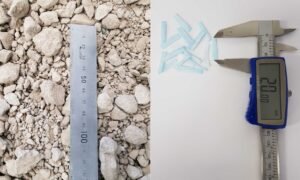Researchers have successfully converted the facemask waste into new road-making material at RMIT University. The civil engineering tools used a mixture of shredded single-use face masks and processed building rubble to create road-making material.
The use of personal protective equipment (PPE) has increased dramatically during the COVID-19 pandemic, with an estimated 6.8 billion disposable face masks being used across the globe each day. The study shows that using the recycled face mask material to make just one kilometer of a two-lane road would use up about 3 million masks, preventing 93 tonnes of waste from going to landfill. The analysis shows the face masks help add stiffness and strength to the final product, designed to be used for base layers of roads and pavements.

Roads are made of four layers: subgrade, base, sub-base, and asphalt on top. All the layers must be strong and flexible to withstand heavy vehicles’ pressures and prevent cracking. Processed building rubble – known as recycled concrete aggregate (RCA) – can potentially be used on its own for the three base layers. But the researchers found adding shredded face masks to RCA enhances the material while simultaneously addressing environmental challenges on two fronts: PPE disposal and construction waste.
Professor Jie Li leads the RMIT School of Engineering research team, which focuses on recycling and reusing waste materials for civil construction. Li said the team was inspired to look at the feasibility of blending face masks into construction materials after seeing so many discarded masks littering their local streets. He added that, “We know that even if these masks are disposed of properly, they will go to landfill or they’ll be incinerated. The COVID-19 pandemic has not only created a global health and economic crisis but has also had dramatic effects on the environment. If we can bring circular economy thinking to this massive waste problem, we can develop the smart and sustainable solutions we need.”
The innovative method to convert the facemask waste into roads could be adopted worldwide to tackle pollution in a green and professional way.



